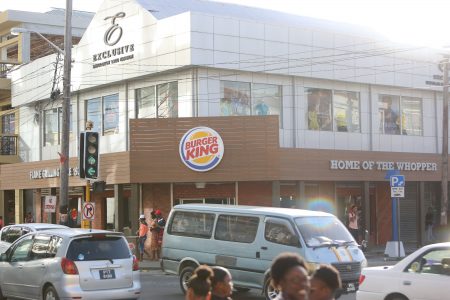Hi Everyone,
 Guyana opened its latest fast food restaurant chain in December – Burger King – and from all accounts, it’s a huge success. I write a food column so it is obvious that people will ask my opinion about such things, just as they did when the Kentucky Fried Chicken (KFC) franchise reopened under new management in 2016. Let me share with you what I said back then in a private email and pose some questions for us to think about as we welcome another fast food chain to Guyana.
Guyana opened its latest fast food restaurant chain in December – Burger King – and from all accounts, it’s a huge success. I write a food column so it is obvious that people will ask my opinion about such things, just as they did when the Kentucky Fried Chicken (KFC) franchise reopened under new management in 2016. Let me share with you what I said back then in a private email and pose some questions for us to think about as we welcome another fast food chain to Guyana.
Question: What do you think of the “saga” in Guyana over the reopening of KFC?
Answer: There is so much to say about fast food in the Caribbean as a whole, and not just Guyana.

Having done a course of study in nutrition I learnt that no food is bad food; there are, however, foods that have a higher caloric value than others. This high value could be the raw ingredient itself or how it is treated/prepared/cooked. We can have the healthiest of ingredients and make them “unhealthy” (for want of a better word) by how we cook it.
The world has changed in so many ways and so have we. The mistake that many make is that we get rid of EVERYTHING instead of keeping the practices that are pertinent, important, and of value. In this case I am talking about (home) cooking. Convenient and fast is how we want EVERYTHING, including our food, and, producers and manufacturers, coupled with excellent marketing strategies are only too willing to respond that demand.
There is nothing wrong with fast food. When it (fast food) becomes a problem is when we abuse it (such as one would abuse alcohol); we abuse fast food by consuming it too often and in large quantities. Instead of seeing it as a treat every now and then, even if that is weekly, we treat it as normal everyday food thereby increasing our consumption. The increased consumption then results in all sorts of health-related problems because we are not balancing our food intake. Everything in moderation. I like fast food. I eat fast food. I would not want to live in a world where fast food does not exist. After all, it is food and it tastes good! Well, some more than others, but I digress.
You cannot ask people to eat healthier when you are flooding the market with economically attractive fast food while making healthier options expensive or not readily available. The other thing is this, as the regulators allowing in fast food chains, one can demand that there be healthy options on the menus like salads etc. and ask them to create a few items of dishes that are in keeping with the cuisine of the country. This is done in larger markets like Brazil, Asia and elsewhere. But here in the Caribbean, we let people dictate to us and let in everything behaving how we are sometimes perceived, “never see come fuh see”.
I ended my response by referencing the epidemic of chronic non-communicable diseases we have in Barbados and the growing number of local and international fast food outlets opening on the island, which frankly, I find to be excessive given the size of the population.
Now, here are those promised questions for us to ponder.
Can we really object to more fast food and other food related franchises opening up when we operate within a market economic system (free market economy)?
Can we argue when these entities are able to provide hundreds of jobs with the most recent World Bank report putting our unemployment rate at 11.28%?
Does government have policies and regulations in place that monitor and evaluate the granting of certain licenses/permissions taking into consideration possible long term (health) effects on the nation?
Can or should we embark on a public education programme about a balanced eating lifestyle? You cannot send mix messages though like we do here in Barbados where we plaster the insides of the buses students take to school with fast food ads. But then again, we are in a free market right?
We cannot expect government to take care of everything. Should we not take responsibility for our own behaviours and actions when it comes to eating well and feeding our children?
How many and how much of the ingredients for the menu items on these fast food establishments are sourced locally? Are we producing enough to meet the demand, if not, where are the products coming from and what is the quality of those items? Are plans and systems being put in place to increase local supply if it is not currently available? In Barbados chicken has to be imported to meet the demand of fast food eateries; one franchise, (which I will not name) had to remove an item from their menu due to the inability of the local market to meet the demand. And that same franchise had to justify to authorities why they had to import a product for one of their signature items, even though a brand of the product is produced and sold here. Again, the issue was that the local producer physically could not meet the demand.
Finally, we cannot run away from reality. People have changed palettes and that is reflected in our changed eating habits. There will always be a place for fast food eateries – it’s a treat, and you know exactly what you are getting in terms of quality, taste and satisfaction.
Cynthia





